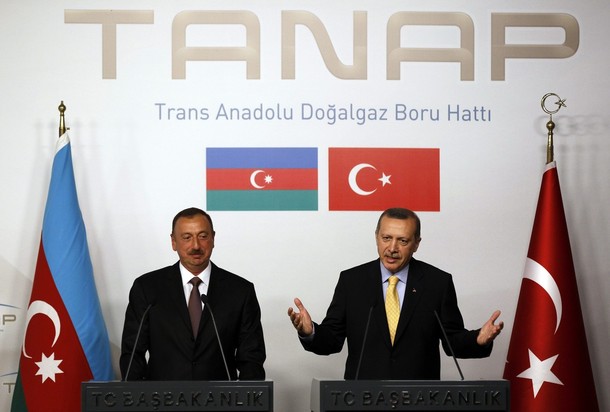
Tensions in the Caspian basin intensified this summer when Turkmenistan said it will bring a dispute about ownership of energy-rich Caspian Sea fields against Azerbaijan before the UN International Court of Justice. The atmosphere of distrust this incident created might seriously undermine the feasibility of future energy projects aimed at reducing Europe’s dependence on Russian gas and therefore raises concerns about Europe’s future energy security.
The West needs to engage to mitigate this dispute. Its resolution would be a cornerstone for the region’s and the West’s future energy diversification projects and Western involvement would balance Russia and China’s influence in the region.
Even though Nabucco is at this point a dead initiative, there are plenty of opportunities for the West to reinstate its commitment to the region through projects. Gerhard Roiss, chief executive of OMV, a Nabucco-backing company, declared this April, “This pipe will be pronounced dead 100 times, but it will be alive again 101 times.” As long as energy diversification is on the EU table, projects like Nabucco will rise and fall until the interests of all involved parties are be reconciled.
Such projects keep emerging. TANAP, gas pipeline from Azerbaijan through Turkey to Europe proposed and funded primarily by Azerbaijan and also Turkey, and the so called Nabucco West, a western branch of the Nabucco project beginning at the Bulgarian-Turkish border, are examples of this. The Trans-Caspian gas pipeline idea, which would extend from Turkmenistan to Azerbaijan through the Caspian Sea and without which Azerbaijan cannot satisfy European demand, is unfeasible until the delimitation problem is resolved. This dispute is between five littoral Caspian states that cannot agree on proper delimitation of the Caspian Sea on national sectors.
The problem is not only Azerbaijan and Turkmenistan, but also bigger players: Russia and Iran, who are not interested in constructing the pipeline at all. Energy projects bypassing Russia are perceived by its government as a direct threat to Russia’s economic and geopolitical interests. In light of sanctions imposed by the West on Iran, the country is predisposed against the West. Therefore, Moscow and Tehran will put every effort into preventing the fruition of any energy project that excludes their involvement. A kind of Cold War and mutual distrust govern the Caspian Basin, which doom to failure any energy project.
Turkmenistan has budding projects with China and India, the implementation of which would ensure Turkmenistan’s gas diversification, be it westward or eastward. Currently Turkmenistan produces 60 billion cubic meters per year but, with 7.5 trillion cubic meters of natural gas deposits, has the potential for much larger quantities. This is an immense gas potential that European companies should invest in to ensure European energy security.
While China possesses the necessary capability, willingness, and finances to step in and invest in this market to meet its own skyrocketing energy demand, Western oil companies have the advantages of better equipment, more sophisticated technology, and long, proven experience. The West must use these advantages.
The West should engage deeper in the region, to balance off Russia and China. Initiatives such as TANAP, Nabucco, and Nabucco West demonstrate Azerbaijan’s willingness to cooperate with the West, in order to secure its energy policy through diversification. So, too, is Turkmenistan. It is not accidental that President Gurbanguly Berdimuhamedov paid his first official visit after being re-elected for a second term to Turkey. Among his top agenda issues was Turkmenistan’s gas deliveries diversification, particularly the question of participation in TANAP.
Leaders of these countries seem to understand that their long-term development depends on successful energy supplies diversification and interaction with the West. That is true despite the fact that currently Azerbaijan and Turkmenistan sell its gas to Russia on advantageous conditions and both countries are therefore commercially better off in the short-term. Yet they signal to Western countries that in the long term, they prefer close engagement with them over Russia.
Implementation of any meaningful energy project will fail as long as Caspian littoral countries can’t come to an agreement. This task is quite complicated for the West, but worth engaging in, as the resolution of Caspian basin dispute would be a cornerstone for future projects and initiatives on European energy security.
Farid Osmanov is an intern with the Atlantic Council’s Dinu Patriciu Eurasia Center. Photo Credit: Reuters Pictures
Image: TANAP%20Pipeline.jpg
